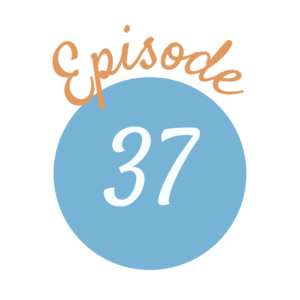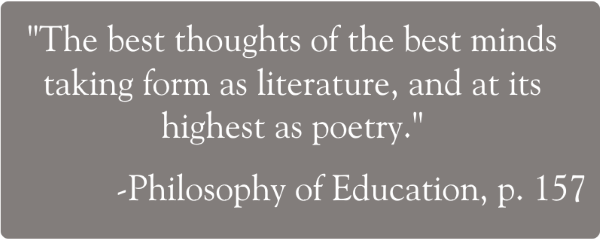
Poetry was a deep love of Charlotte Mason’s, and this week’s podcast explores that wonder and delight as it can unfold in your school day and life. Are you nervous, intimidated, worried, or resistant to teaching poetry? Listen to this laid back interview between Liz and our good friend, Bonnie Buckingham, veteran homeschool mom who learned to love poetry by teaching it.
Listen Now:
“Poetry is, perhaps, the most searching and intimate of our teachers…Poetry supplies us with tools for the modeling of our lives, and the use of these we must get at ourselves.” (Vol. 4, p. 71)
“Heroic Poetry Inspires to Noble Living––”To set forth, as only art can, the beauty and the joy of living, the beauty and the blessedness of death, the glory of battle and adventure, the nobility of devotion––to a cause, an ideal, a passion even––the dignity of resistance, the sacred quality of patriotism, that is my ambition here,” says the editor of Lyra Heroica in his preface.” (Vol. 2, p. 141)
If you would like to study along with us, here are some passages from The Home Education Series and other Parent’s Review articles that would be helpful for this episode’s topic. You may also read the series online here, or get the free Kindle version from Fisher Academy.
Parents and Children (Volume 2), Chapter 14
Ourselves (Volume 4), Book II, Section II, Chapter 12
Towards a Philosophy of Education (Volume 6), Book I, Section II (b)
Richard Wilbur (Contains affiliate links)
Charlotte Mason Institute, Western Conference
Grace To Build Retreat
A Delectable Education: Episode 13: Discussion of Charlotte Mason’s narrative poetry on the Gospels
What is Poetry? from the Parents’ Review
On the Teaching of Poetry from the Parents’ Review
The Teaching of Poetry from the Parents’ Review
The Teaching of Poetry to Children from the Parents’ Review


























What a wonderful episode! I was so excited to hear Longfellow mentioned! We focused on him this year reading Courtship of Miles Standish, Evangeline, Song of Hiawatha and Tales of a Wayside Inn. We truly love his natural and seemingly effortless lyric storytelling.
My absolute favorite anthology is A Treasury of Christian Poetry, compiled by Mary Batchelor. I found this years ago as I began homeschooling, and it was part of my education in poetry, introducing me to Rossetti, Shaw, Milton, Herbert, Donne and many others. (But I am unfamiliar with Billy Collins 😀 )
I appreciate the discussion, and ideas, and the links to the articles and CM quotes. Thanks again for a wonderful, helpful podcast!
Thank you so much for this episode on poetry. It was inspiring to me. I wanted to share that I have found The Book of Heroic Verse by Arthur Burrell free online at https://archive.org/details/bookofheroicvers00burr. I can't buy a copy, so I'm very glad to have found this for free and online. Thank you for introducing me to this book! It looks like a great collection to share with my sons.
Sarah
And thank you for affirming the truth of learning poetry by doing it, as well as the anthology tip. There was so much to say that time did not allow. The world of poetry is immense, and we could only dabble, but how poor the world would be without it.
-Liz
The previous comment on the Treasury of Christian Poetry is so great because I also picked up a copy and am using it for my self-education process as well. I wanted to add too that Marly Youmans is one of my favorite modern poets. She is heavily influenced by the structure of poems and says often on her blog that a new form or style of poetry is what inspires her to start a new work in the same style. She frequently introduces me to other poets, old and new. I loved her ballad style poem called Thaliad.
Sarah,
Thank you for sharing about this poet and your experiences with poetry.
-Liz
Dear Sarah,
It has been a blessing to us as well to have that resource available online. I hope your children enjoy poetry even more when it is in their head and they can speak it aloud to bless others.
-Liz
I'm just listening to this episode now, and enjoyed it so much. I have always read poetry just for fun, I just soaked up the sound of it. When I was very little, my grandmother, who was an English teacher, gave me an old, falling-apart book of poetry from her library. I loved that book, and I still have it, though it has no cover and I have lost the first few pages. I can still see the illustration on the first page, and hear the lines in my head: "Dance, my dearies, dance my pretties, In a snowy ring…" My children also enjoy poetry. A while ago, on the old Childlight USA website, I listened to an mp3 recording of a talk Bonnie gave at a Childlight conference. In it she recited (or read) "At the Garden Gate", by David McCord. It tickled my fancy and I and read it to my children the next day. That poem has become a great family favourite! The oldest children all know it by heart. It is such a fun one, and frogs are great friends of ours.
Can you tell me – (because ao, and scm differ in what they say…) a Poet study was done,one poet and his works were "lived with" (scm say for a year). How should we schedule poetry? scm say 1 poem a week for a year by one poet, yet ao has one poet per term- a poem read daily. On your planning cards you have poetry daily – should we only be doing one poets works every day for a whole year? or should we be reading lots of different poets? I think I remember CM saying an anthology was to be 'eschewed' yet nearly every cm type site I look at puts an anthology on the reading list (classic one hundred poems, or poems old and new) I'm just confused by it all and never read poetry myself so would appreciate some clarity on the best way to do this (I understand the how – just to read and enjoy – its the what and when!)
Thanks!
I have to add that I also learned "Salutation" by Luci Shaw from Bonnie (but I'm not sure where… that same talk, maybe?) and it is in my commonplace book. It is such a lovely thought.
Jo,
Just read poetry–aloud–every day. Mason did like children to become especially acquainted with a particular poet–even says it would be grand to do so for an entire year, but it was not practiced that way necessarily. Perhaps there is a fine poet who only has a very few pieces…that would be tough. We do see anthologies used in her programmes. It is not necessary to read even the poet of special interest every single day. Read various poets, various poems, including a special one you return to again and again over a term–once a week, or a day, or every other week… Perhaps the special poet of a term could be the one whose poems you memorize. Mason did like poets of the time period to be studied in conjunction with history, at least starting in form 2.
Don't miss poetry because you're confused about the varying ways it is enjoyed. Just enjoy!
-Liz
Natasha,
Thank you for sharing your personal experiences and your love of poetry with us.
-Liz
Hello,
I’m a little confused about the scheduling of poetry. If we are to read a different poem every day, do we pick one of these to memorise and copy? If this is correct often do they memorise a new poem?
Thank you for all your advice and support.
Heather.